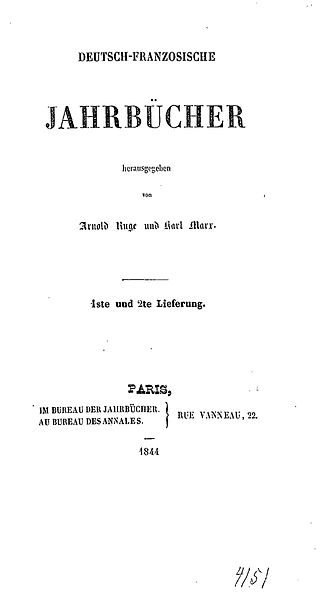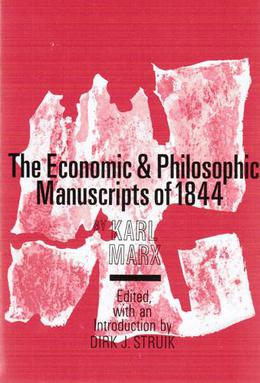Historicism is an approach to explaining the existence of phenomena, especially social and cultural practices, by studying their history; that is, by studying the process by which they came about. The term is widely used in philosophy, anthropology, and sociology.

Karl Marx was a German-born philosopher, economist, political theorist, historian, sociologist, journalist, and revolutionary socialist. His best-known works are the 1848 pamphlet The Communist Manifesto and the three-volume Das Kapital (1867–1894); the latter employs his critical approach of historical materialism in an analysis of capitalism and is the culmination of his intellectual efforts. Marx's ideas and theories and their subsequent development, collectively known as Marxism, have exerted enormous influence on modern intellectual, economic and political history.

Bruno Bauer was a German philosopher and theologian. As a student of G. W. F. Hegel, Bauer was a radical Rationalist in philosophy, politics and Biblical criticism. Bauer investigated the sources of the New Testament and, beginning with Hegel's analysis of Christianity's Hellenic as well as Jewish roots, concluded that early Christianity owed more to ancient Greek philosophy (Stoicism) than to Judaism.

Karl Marx's theory of alienation describes the estrangement of people from aspects of their human nature as a consequence of the division of labor and living in a society of stratified social classes. The alienation from the self is a consequence of being a mechanistic part of a social class, the condition of which estranges a person from their humanity.
"On the Jewish Question" is a response by Karl Marx to then-current debates over the Jewish question. Marx wrote the piece in 1843, and it was first published in Paris in 1844 under the German title "Zur Judenfrage" in the Deutsch–Französische Jahrbücher.

Critique of Hegel's Philosophy of Right is a manuscript written by the German political philosopher Karl Marx in 1843 but unpublished during his lifetime—except for the introduction, published in Deutsch–Französische Jahrbücher in 1844. In the manuscript, Marx comments on excerpts of Georg Wilhelm Friedrich Hegel's 1820 book Elements of the Philosophy of Right that deal with 'civil society' and the state paragraph by paragraph. One of Marx's major criticisms of Hegel in the document is the fact that many of his dialectical arguments begin in abstraction.

The Deutsch–Französische Jahrbücher was a journal published in Paris by Karl Marx and Arnold Ruge. It was created as a reaction to the censorship of the Rheinische Zeitung.

Influences on Karl Marx are generally thought to have been derived from three main sources, namely German idealist philosophy, French socialism and English and Scottish political economy.
19th-century German philosopher Karl Marx, the founder and primary theorist of Marxism, viewed religion as "the soul of soulless conditions" or the "opium of the people". According to Marx, religion in this world of exploitation is an expression of distress and at the same time it is also a protest against the real distress. In other words, religion continues to survive because of oppressive social conditions. When this oppressive and exploitative condition is destroyed, religion will become unnecessary. At the same time, Marx saw religion as a form of protest by the working classes against their poor economic conditions and their alienation. Denys Turner, a scholar of Marx and historical theology, classified Marx's views as adhering to Post-Theism, a philosophical position that regards worshipping deities as an eventually obsolete, but temporarily necessary, stage in humanity's historical spiritual development.
Critique of political economy or simply the first critique of economy is a form of social critique that rejects the conventional ways of distributing resources. The critique also rejects what its advocates believe are unrealistic axioms, faulty historical assumptions, and taking conventional economic mechanisms as a given or as transhistorical. The critique asserts the conventional economy is merely one of many types of historically specific ways to distribute resources, which emerged along with modernity.
Marxist humanism is an international body of thought and political action rooted in a humanist interpretation of the works of Karl Marx. It is an investigation into "what human nature consists of and what sort of society would be most conducive to human thriving" from a critical perspective rooted in Marxist philosophy. Marxist humanists argue that Marx himself was concerned with investigating similar questions.

The correct place of Karl Marx's early writings within his system as a whole has been a matter of great controversy. Some believe there is a break in Marx's development that divides his thought into two periods: the "Young Marx" is said to be a thinker who deals with the problem of alienation, while the "Mature Marx" is said to aspire to a scientific socialism.
Marxist–Leninist atheism, also known as Marxist–Leninist scientific atheism, is the antireligious element of Marxism–Leninism. Based upon a dialectical-materialist understanding of humanity's place in nature, Marxist–Leninist atheism proposes that religion is the opium of the people; thus, Marxism–Leninism advocates atheism, rather than religious belief.

The Poverty of Philosophy is a book by Karl Marx published in Paris and Brussels in 1847, where he lived in exile from 1843 until 1849. It was originally written in French as a critique of the economic and philosophical arguments of French anarchist Pierre-Joseph Proudhon set forth in his 1846 book The System of Economic Contradictions, or The Philosophy of Poverty.
The following is a list of the major events in the history of German idealism, along with related historical events.

The Economic and Philosophic Manuscripts of 1844, also known as the Paris Manuscripts or the 1844 Manuscripts, are a series of notes written between April and August 1844 by Karl Marx. They were compiled and published posthumously in 1932 by the Soviet Union's Marx–Engels–Lenin Institute. They were first published in their original German in Berlin, and there followed a republication in the Soviet Union in 1933, also in German.

The Young Hegelians, or Left Hegelians (Linkshegelianer), or the Hegelian Left, were a group of German intellectuals who, in the decade or so after the death of Georg Wilhelm Friedrich Hegel in 1831, reacted to and wrote about his ambiguous legacy. The Young Hegelians drew on his idea that the purpose and promise of history was the total negation of everything conducive to restricting freedom and reason; and they proceeded to mount radical critiques, first of religion and then of the Prussian political system. They rejected anti-utopian aspects of his thought that "Old Hegelians" have interpreted to mean that the world has already essentially reached perfection.
Marxist philosophy or Marxist theory are works in philosophy that are strongly influenced by Karl Marx's materialist approach to theory, or works written by Marxists. Marxist philosophy may be broadly divided into Western Marxism, which drew from various sources, and the official philosophy in the Soviet Union, which enforced a rigid reading of Marx called dialectical materialism, in particular during the 1930s. Marxist philosophy is not a strictly defined sub-field of philosophy, because the diverse influence of Marxist theory has extended into fields as varied as aesthetics, ethics, ontology, epistemology, social philosophy, political philosophy, the philosophy of science, and the philosophy of history. The key characteristics of Marxism in philosophy are its materialism and its commitment to political practice as the end goal of all thought. The theory is also about the struggles of the proletariat and their reprimand of the bourgeoisie.
Historical materialism is Karl Marx's theory of history. Marx locates historical change in the rise of class societies and the way humans labor together to make their livelihoods.
Outlines of a Critique of Political Economy is an article by Friedrich Engels, first published in German in 1843 for the Deutsch-Französische Jahrbücher.








